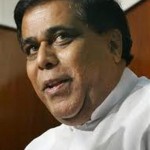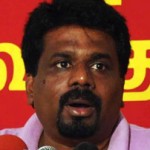Columns
The test of Yahapalanaya
View(s):The recent fiasco concerning the bond scandal has given the anti-Maithri clique a welcome full toss to smash over the pavilion so early in the new innings. Rightly they have accused the Government of making a pig’s breakfast of the Central Bank Governor’s appointment and even taken their protest to the streets. But however great and grave the error, howsoever sour the taste allegations of insider dealings have left in the nation’s mouth, was it justified to have put the concept of ‘yahapalanaya’ in the stockade and run Maithripala up the gum tree for it?
 Of course it was a heaven sent opportunity to pooh-pooh and ridicule the inspiring vision of Maithripala Sirisena that captured the nation’s imagination and brought about the downfall of the corrupt Rajapaksa regime. It was manna from the sky for a demoralised gang of thieves and for the others who were the recipients of their ill-gotten largesse to refer to the scandal in the city and pronounce in purer than white pious tones: “is this the big ‘yahapalanaya’ of the new Maithri government?”
Of course it was a heaven sent opportunity to pooh-pooh and ridicule the inspiring vision of Maithripala Sirisena that captured the nation’s imagination and brought about the downfall of the corrupt Rajapaksa regime. It was manna from the sky for a demoralised gang of thieves and for the others who were the recipients of their ill-gotten largesse to refer to the scandal in the city and pronounce in purer than white pious tones: “is this the big ‘yahapalanaya’ of the new Maithri government?”
Funnily enough, yes.
Blunders, scandals, corruption, rackets happen even in the best of families. Shady questionable transactions and sleazy insider dealings occur in the money market and will continue to do so in the future, no matter the government. Ministers will make mistakes, may even commit corrupt acts as some manifestly did under the previous government. The country is not one brimming with arahaths or sainted vas’ses. The mere fact that there has been an instance of a manifest blunder of considerable magnitude is not in itself a reflection of yahapalanaya, as some have taken it to be and use it as a weapon to attack the new dawned government.
The test of yahapalanaya is how a government reacts when it blunders; or when corrupt acts are brought to light. It is how a government rises to the occasion and how it responds that determines whether yahapalanaya or good governance exists or whether it is a sham. It is then that the mocking can start, the condemnation can begin, and not before.
After the bond scandal broke, there was no cover up. No attempt to stop the free flow of news. No attempt to stop the protests, even the marches to what was once a high security zone where even a dog strayed only at it its own peril. And the marches were led by none other than the Parliamentary leader of the SLFP of which President Sirisena is the chairman. Would all this have been possible under the Rajapaksa regime? Would any have pursued the scandal in open print for fear of inviting white vans to their front door? Would any have dared to take to the streets, dared to vilify the Rajapaksa regime and dared to taste the Rajapaksa wrath?
Prime Minister Ranil Wickremesinghe has since appointed a committee to probe the bond scandal. The Governor of the Central Bank has been sent on leave. And today Parliament awaits the inquiry report to decide what to do next? So far, so good. The entire affair has upto now been handled as the practice of good governance or yahapalanaya dictates, with promptness and with transparency. What a far cry from the way the previous regime handled the hedging issue three years ago which cost the country billions of rupees, a proper and determined inquiry into which has only now commenced. However if there is any attempt to sweep the bond affair under the carpet, then the Government’s practice of good governance must be put in the dock and flayed.
The best police force in the world cannot prevent the killing of a man and the gang rape of a foreign girl at a Tangalle hotel. The Rajapaksa regime cannot be blamed for the tragic occurrence. But what warranted condemnation was the blatant cover-up that ensued, the political influence that was used to enable the killers and the rapists to roam free the broad acres of the land as sacred political beasts, until two years later, it took a visiting British Prime Minister to exert enough pressure on the Rajapaksa Government to bring them to trial. A government committed to the establishment of law and order cannot be blamed for an axe murder, even when the victim happens to be the President’s own brother. Every human weakness, each folly, each criminal act cannot be left at the Government’s door. It is in the manner a government responds, whether it permits investigations to be carried out independently, that reveals the mettle of its good governance testament.
Yahapalanaya does not, cannot and must not come to mean a weak government that shirks from discharging its paramount duty to maintain law and order on the streets. It does not mean an effeminate form of rule that watches apathetically while anarchy spills out onto the roads. Much is made of the tear gas attack on a students’ protest near Temple Trees on Wednesday. If the police had gone over the top and used excessive force then it should be probed and the report published with corrective measures taken. That is the stuff of Good Government. The Mahinda camp who denounce it as an example of yahapalanaya in action, now pretend as if the Rajapaksa regime treated protesters with kid gloves and sent them home with tea and cupcakes or that the armed forces were deplored and ordered to sprinkle water on thirsty souls instead of spraying bullets at Rathupaswala when villagers protested over companies which were discharging their effluence to the ground and contaminating their water wells, leaving them bereft of clean drinking water.
Yahapalanaya is governance dedicated to the ideals of democracy. It is not an ‘anything goes’ form of governance where each is allowed to act as he wishes with scant regard to the principle that one’s freedom stops at the end of another’s nose. It is government that functions within the well-established framework of law, where everyone is held equal, which guarantees redress if and when one’s fundamental freedoms are infringed by the state. It is one that operates with transparency, one that is accountable to the people. It is also the one the people voted to be governed by at the last election three months ago and it behoves us all to protect the fledgling as it seeks space and time to mature.
Today there is a concerted campaign to bring the concept of Yahapalanaya into disrepute by those who seek the leaky shelter of the Rajapaksa umbrella. They crave the Yamapalanaya practised by the former regime during which dark era they, shielded by political immunity, could commit fraud on the people with impunity. They now seek the return of Mahinda Rajapaksa, conjure up a sham image to create the illusion that the rest of the country also want him back in the saddle — three months after rejecting him — not because they love him but because they know he will protect them from the present crackdown on the corruption even as he has urged in a letter sent to the new SLFP secretary on February 16: “The SLFP as a party should always be there to protect the party and its members whenever they are under threat.”
The fact that they have become desperate was revealed on Thursday when a group of UPFA MPs even went to the extent of attempting to tar the good image of the newly appointed Bribery Commission Director General Dilrukshi Dias by filing a petition against her at her office. The nature of the charge reveals the degree of their desperation. They claimed that thirteen years ago she had, whilst working at the Attorney General’s Department, also worked at the Telecommunications Regulations Commission as a consultant and drawn two salaries from 2002 to 2008. On Friday she categorically denied the charge and requested the Commission’s Chairman Justice Jagath Balapatabendi to conduct a full-scale probe into her actions. She said that the baseless and frivolous allegations were made to demoralise her and prevent her from fighting corruption.
To take a hypothetical example, even if a person had worked at the AG’s office and had simultaneously worked at the Telecommunications Regulations Commission as a consultant and drawn two salaries for the work one had done, does it tantamount to a grievous criminal offence, a heinous moral crime? If it does, then into what bracket do you place the plunder of the nation’s coffers to the tune of 5.6 billion dollars the Government claims the Rajapaksa regime siphoned off from the Treasury?
It is to end that dark period when SLFP Public Relations Minister Mervyn Silva could boldly say on national television, “Why can’t my son have an expensive sports car? If I want to I will buy him a helicopter. It is nobody’s business. Don’t forget that we have a family business”: or SLFP Sports Minister Mahindananda Aluthgamage could brashly declare at a public meeting last year, “The Government is ours, the army is ours, the police are ours, therefore it is according to what we want that this election is conducted” that the nation voted for Maithripala to usher in Yahapalanaya.
Now that the nation has emerged from the sewers to which it had been condemned, it will be the tragedy of our times if we do not use this opportunity to strengthen the pillars of democracy and see it flourish once more. Yahapalanaya is not a way of governance that can be wished into existence by the single swish of a magic wand held by Maithripala Sirisena alone but one that must be embraced by the people after understating its full import and the practical benefit it brings to the quality of a nation’s life. It has to be earned. It has to be deserved. It has to be appreciated and cherished. It must be safeguarded. It is not for nothing that founders of American democracy have declared so oft: ‘Eternal vigilance is the price of liberty.’
The question is whether the people of this country are going to stand idle and watch with indifference while the swine attempt to crush the pearl it does not value or smother to death with mockery and ridicule and then cook the nation’s goose even before it had laid its first gilded egg? The choice is yours: Return to the old Yamapalanaya past or live the new Yahapalanaya future.
| SUNDAY PUNCH 2
Full moon in the House
It is indeed a curious state of affairs that exists today in Lanka’s body politic and, to put it mildly, it is getting curiouser and curiouser.  Nimal: Jekyll and Hyde First of all, for the first time we have a president who contested the election not on the UNP or on the SLFP ticket but from a party called the National Democratic Front which suddenly appeared out of the blue to be used as the swan vehicle to glide him to a stunning presidential victory. No sooner the objective was achieved it was discarded; and now is heard no more. In the best traditions of Buddhist philosophy, who but a fool carries with him the boat of faith after crossing the river of doubt? Simply put: don’t carry deadweight. In Maithripala Sirisena’s case it would have hindered his forward march back to the SLFP past.
Secondly we have the leader of the UNP, Ranil Wickremesinghe, appointed as the Prime Minister by the President under Article 43 of the present constitution who, in his opinion, is the Member of Parliament ‘most likely to command the confidence of Parliament’, even though, on January 9 when the appointment was made, the UNP had only 41 seats in the House compared to the SLFP’s blockbuster majority of over 130 seats.
 Dinesh: Bring Mahinda Thirdly President Sirisena who on the very day he announced his candidature also declared that, though he was contesting as the Member of the National Democratic Front for the presidency, he was still the secretary of the SLFP. He stated that the mere fact that he intended to take on the then chairman of the party did not mean he had vacated his post or relinquished his membership if the party.
But strangely, after getting himself appointed as the new chairman of the SLFP he seemed disinclined to bend it to his will — more bent, perhaps, to cast it adrift rudderless, without a captain at the helm and thus give the impression it was a credible opposition to the Sirisena-Wickremesinghe government. The SLFP’s Billy Bunter of Badulla, the amiable Nimal Siripala de Silva, emerged to fill the vacuum as the leader of the opposition while the fringe parties did not make any fuss as to how the SLFP could be the opposition when its chairman was the president and head of the cabinet – as they split hairs now holding the JVP is not eligible to be the main opposition party due to its membership of the National Executive Council.  Sampanthan: Tamil rights
But last month’s appointment by the president of 26 SLFP members as cabinet, state and deputy ministers to his Ranil Wickremesinghe-dominated government has made the SLFP claim to be the official opposition party now untenable. And the scramble has begun amongst the smaller parties to lay claim to this important position which would elevate them to a status far greater than their puny stature deserves, causing the Speaker of the House to burn the midnight oil reading up his Erskine May to provide a past parliamentary practice pointer to the path to plod in deciding who best fits the bill.
But read as he may it is doubtful whether the British Parliamentary Bible would be of any help in this instance. The only recent British coalition government was during the Second World War years during 1940 to 1945 when all parties united sans a partisan divide to defeat the common enemy the Nazis. Then there was no opposition leader during this period. There was simply no opposition. It was all for one and one for all unlike Lanka where it is none for all and all for none.
 Anura: Born opposer Instead the Speaker, former President Mahinda Rajapaksa’s brother, Chamal Rajapaksa, would have to be guided by the experience he has gained during the tenure of his office since 2010 to anoint the next leader of the opposition. If he does not accept Nimal Siripala’s position that the SLFP can be a schizophrenic party and can wear the Jekyll hat when it comes to supporting the Government and use the Hyde boots anytime it is called upon to kick its own members who are presently members of the Government led by the President who is the chairman of the SLFP, his choice will boil down to the radical born opposers, the JVP or the Tamil rights champions the TNA or the “We miss Mahinda, please bring him back” faction of parties, each one a virtual one man show, led by the ‘wannabe Rajapaksas’ Mahajana Eksath Peramuna (or is it the Mahinda Ekamuthu Pakshaya now) leader Dinesh Gunawardena.
So as the Lankan Parliament gears itself to emerge probably as the only Parliament in the world to have a Prime Minister coming from a party that doesn’t command the majority of the House and the Leader of the Opposition coming from a party that doesn’t command the majority of the opposition, the curious lunar circle seems set to reach maximum waxing point in the coming week. |


Leave a Reply
Post Comment